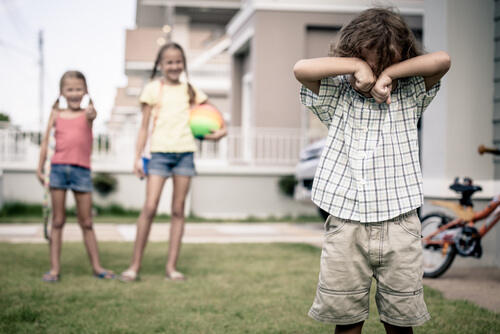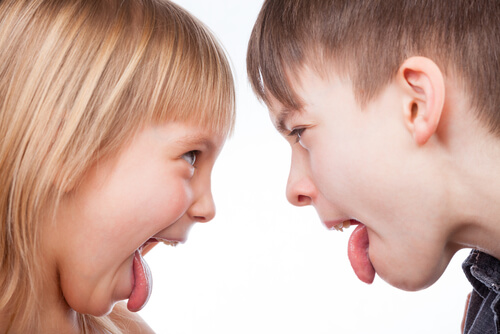Teaching Your Child not to Make Fun of Others

It’s very important to teach our children never to make fun of others. Children should learn that behaviors like teasing and bullying are harmful and affect our ability to relate to the people around us.
Making fun of others hurts everyone involved
We don’t often think about a child who makes fun of others as being a victim. But in reality, cruel behavior often disguises weakness and fear.
Making fun of others can be evidence of bad behavior learned at home, or can be a sign that a child is not comfortable in their own skin.
In some cases, children who have been victims of teasing lash out at other children to protect themselves.
Teaching values begins at home. Some parents fail to put a stop to behaviors such as making fun of others, simply because they don’t see them as a problem.
It may be that in their household, it’s normal to make unkind remarks about others. When this is the case, children copy what they see.
Aggression at home
When a child is making fun of others, it’s worth finding out why. A lack of affection or aggression at home can trigger bullying in children.
Kids who grow up in this kind of environment may take out their frustration on others, through verbal and physical attacks on their apparently weaker peers.
All parents should understand that making fun of others can trigger aggressive behavior in their child. It can also affect their performance at school and undermine their ability to form meaningful relationships with others.
In terms of discipline, parents who observe their children engaging in bullying must take action immediately.
Educating children on matters of emotions and relationships is something that takes time. Teaching a child not to make fun of others means helping them see that this kind of behavior is wrong.
Inviting children to put themselves in the other person’s place is one way to do this, by encouraging empathy.

How to teach a child that making fun of others is wrong
Making fun of others can lead to rejection, bad grades at school, low self-esteem, increased aggression and insecurity. It also exacerbates aggression and insecurity. It goes against every rule of social behavior.
Show them that others could do the same to them
When a child is making fun of others, they are trying to take control of a situation and get attention. This might be the only way to relate to others they know.
The best way to put a stop to this behavior is by talking to your child. Explain the damage it does to others, and how unpleasant it is to be on the receiving end.
It’s also important to show your child that making fun of others involves a risk. If they continue to do it, others may also decide to make fun of them or be aggressive towards them.
Lead by example
Parents must be a good role model and practice what they preach. It’s also important to reinforce positive behavior by praising the child when they do the right thing.
Love and affection are vital for teaching children not to make fun of others. A child who feels loved is less insecure, and far less likely to resort to aggression.
Respect and tolerance: fundamental values
When the child understands the damage caused by cruel words, they’ll learn to accept other people and respect their differences.
Developing values such as respect and tolerance will help your child to get along with others. As well as giving them a happier childhood, you’ll help them to grow up into a better person in the future.

Parental introspection
To teach your child not to make fun of others, it’s important to reflect on your own behavior.
Parents with low self-esteem who have difficulty forming friendships won’t be able to lead by example. For this reason, moms and dads must know and value themselves to help their children do the same.
Encouraging and motivating your little one is essential. Help them make new friends, to be positive about others and cooperate. This will help correct unkind behavior.
Good professional advice can help children face their frustrations, manage their anger or insecurity and learn how to get along with others.
What if my child is being teased?
When our children are on the receiving end of teasing or bullying, it’s especially important for parents to teach security and show them not to fear what others say about them. One strategy may include using humor to deflect cruel remarks.
If your child is being made fun of, offer them love and understanding. Reinforce their self-esteem and teach them to be true to themselves, regardless of what others may say.
All cited sources were thoroughly reviewed by our team to ensure their quality, reliability, currency, and validity. The bibliography of this article was considered reliable and of academic or scientific accuracy.
- Castillo Quiñonez, G. G. (2015). Promover los valores sociales y familiares para evitar las burlas y el índice de malas palabras dentro del salón de clases en los niños de 4 a 5 años de la escuela Dr. Otto Arosemena Gómez año lectivo 2014-2015(Bachelor’s thesis, Universidad de Guayaquil Facultad de Filosofía, Letras y Ciencias de la Educación). http://repositorio.ug.edu.ec/handle/redug/13219
- Reynolds, C., & Richmond, B. (1997). Escala de ansiedad manifiesta en niños (revisada). CMAS-R. Manual. México: El Manual Moderno.
- Albornoz, N., Silva, N., & López, M. (2015). Escuchando a los niños: Significados sobre aprendizaje y participación como ejes centrales de los procesos de inclusión educativa en un estudio en escuelas públicas en Chile. Estudios Pedagógicos (Valdivia), 41(ESPECIAL), 81-96. https://scielo.conicyt.cl/scielo.php?pid=S0718-07052015000300006&script=sci_arttext
This text is provided for informational purposes only and does not replace consultation with a professional. If in doubt, consult your specialist.
